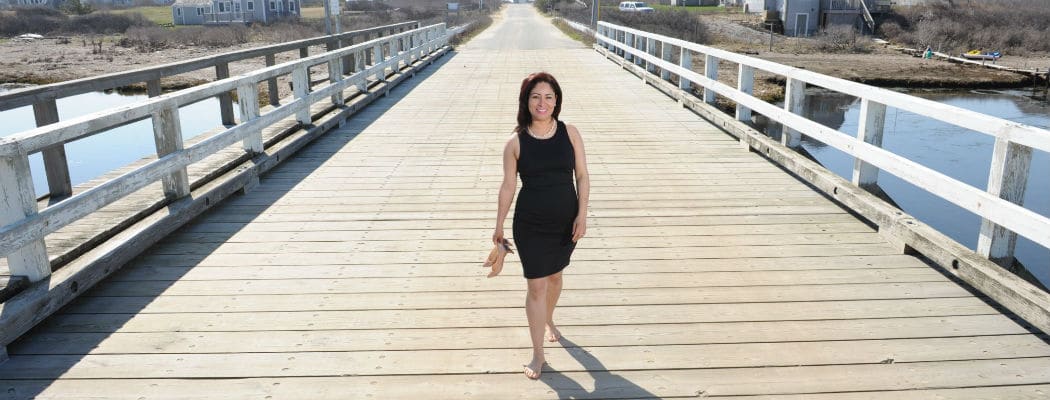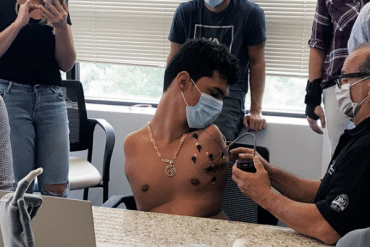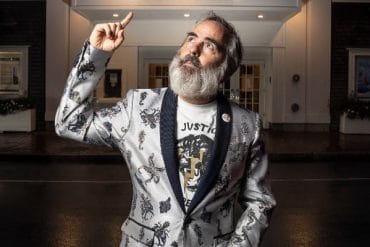How Island resident Maria Partida is helping bridge the growing language gap on Nantucket.
When Maria Partida was asked to attend a gathering of island non-profits at the Westmoor Club this spring, she had no idea that she was going to end up as a featured speaker. Having become a well-known advocate for Nantucket’s ever-growing Hispanic population in recent years, Maria was an obvious choice for the organizers of the Camp Safety Summit, a collective of more than forty island organizations that host summer camps and programming for children. They gather each spring to discuss best practices, safety, and new ways of improving the lives of children on Nantucket. When Maria left the stage after telling her story, the audience of more than seventy-five nonprofit workers was in tears.
 A mother and homemaker who emigrated from Mexico to Nantucket by way of Washington State in 2000, Maria unexpectedly found herself becoming a community advocate. It all started when friends and family began asking her to serve as their translator when they needed to go to Nantucket Cottage Hospital or communicate with any number of island institutions. Soon strangers as well as major island institutions such as the Nantucket Public Schools (NPS) started calling.
A mother and homemaker who emigrated from Mexico to Nantucket by way of Washington State in 2000, Maria unexpectedly found herself becoming a community advocate. It all started when friends and family began asking her to serve as their translator when they needed to go to Nantucket Cottage Hospital or communicate with any number of island institutions. Soon strangers as well as major island institutions such as the Nantucket Public Schools (NPS) started calling.
“We couldn’t have enough Maria Partidas,” said Jeremiah Splaine, the NPS director of English Language Learners Services (ELL). “We need people like her with the inclination and energy to improve the schools and the community. She is someone we really value in terms of advocacy and giving us good input.”
Since the early 2000s, the island’s public school system has held classes and programs aimed at integrating and assimilating the ELL community through local initiatives and state and federally mandated programming. That population now represents over 14 percent of the students in the local school system. They are a segment of a larger number of ethnic minorities that now make up nearly 45 percent of NPS, according to data collected by Splaine over the past twenty-plus years.
With the revival of the economy in recent years, there has been a renewed influx of immigrant families coming to Nantucket from all corners of the globe for work. There are currently eleven identified languages spoken in the halls of NPS besides English, and the ELL program, which had ninety-six students participating at some level in 2013, now has over 230. Splaine said that number does not reflect the seventy to eighty students that have exited the program and now are considered mainstream. All told, more than ninety of these students have graduated from Nantucket High School after completing the ELL program.
Maria explained that many of the families she assists come to Nantucket because they hear of good jobs, but at first often struggle to understand the culture and fit into the American landscape. Although seeking a better quality of life is the primary reason why people come here, it is not the only reason. Some come to Nantucket because their lives literally depend on it.
“A lot of these people have had it really tough,” she explained. “The gangsters [in Mexico] are terrible and many have to live on as little as $5 a day. That is all they have to buy food. Hunger is another real issue that they’ve faced. So there are people running away from the violence, but they are all here to work and help their families.”
 One of the refugees Maria referenced when speaking to the Camp Safety gathering was a woman she now considers a close friend, who originally came from a war-torn El Salvador, where as a child of less than ten years old, she was raped and beaten. The woman also witnessed dozens of hangings and other killings by military factions. Years later, in an effort to escape the horrid violence, she decided to make the dangerous journey to America in order to give her family a future. This took her through Guatemala and Mexico by foot and hidden in vehicles — only to end up nearly starved to death and abandoned just over the Texas border by human traffickers. In a desperate attempt to save herself, she called one of the smugglers who had abandoned her. The woman she spoke to on the phone took pity on her and she eventually made her way to Nantucket where some family members had already established themselves, receiving asylum from them and eventually the U.S. government. With tears running down her cheeks while recounting this story, Maria said it is for people like her that she does this work.
One of the refugees Maria referenced when speaking to the Camp Safety gathering was a woman she now considers a close friend, who originally came from a war-torn El Salvador, where as a child of less than ten years old, she was raped and beaten. The woman also witnessed dozens of hangings and other killings by military factions. Years later, in an effort to escape the horrid violence, she decided to make the dangerous journey to America in order to give her family a future. This took her through Guatemala and Mexico by foot and hidden in vehicles — only to end up nearly starved to death and abandoned just over the Texas border by human traffickers. In a desperate attempt to save herself, she called one of the smugglers who had abandoned her. The woman she spoke to on the phone took pity on her and she eventually made her way to Nantucket where some family members had already established themselves, receiving asylum from them and eventually the U.S. government. With tears running down her cheeks while recounting this story, Maria said it is for people like her that she does this work.
Maria currently sits on several advisory boards in the school system as well as elsewhere in the Nantucket community. She was even asked to run for the school committee, but Maria said she’s not ready to take that on just yet. “I feel like people know me and I’ve always enjoyed volunteering,” she explained. “They just need someone who is willing to help, and because I have the language, I am able to give them what they want to say, but can’t. I know the island and the people. A lot of people have given me so much, I just want to give back.”
The island’s spirit of generosity Maria spoke of at the Camp Safety Summit this spring manifests itself in a variety of ways. For the Hispanic community, with which she is so involved, that spirit of generosity is one of inclusion. “There are many places where the Hispanic, immigrant community is not doing well,” she explained, “but Nantucket is different.” With the selfless help of Maria Partida, the community only stands to improve.






